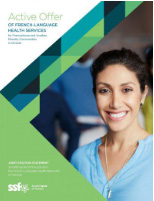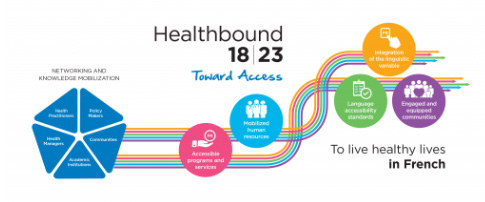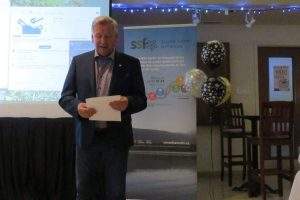SSF 20th Anniversary
Société Santé en français (SSF) marks its 20th anniversary in 2022! This year we look back on two decades of promoting French-language health services for Francophone and Acadian minority communities and improving equity in health services across Canada—a definite cause for celebration!
Celebratory Evening
View some photos from the Société Santé en français 20th anniversary celebration on June 16, 2022 in Moncton.
Impact testimonials
This is a series of video testimonials telling the story of SSF’s impact in different communities. People who have witnessed the development of French-language health services in Canada describe how SSF has made a difference where they live.

Diagnostic of a Success Story
A look at the landmark SSF-led initiatives that have stood out as big successes in the organization’s history and make SSF what it is today. What makes a success? What’s the recipe? This look back shows us how the biggest advances came about.
Timeline: Read about the highlights during this period.
S.O.S. Monfort: The French-speaking community mobilizes to save Ontario’s only Francophone university hospital
February 24: Ontario’s Health Services Restructuring Commission recommends the closure of the Montfort Hospital.
March 22: Nearly 10,000 people pack the room for the Grand Ralliement event. Don Boudria looks back on the experience on Unique FM here.
August 13: The Commission announces that the Montfort Hospital will remain open and will keep its own administration.
In the wake of the mobilization around the hospital all across French Canada, French-language healthcare emerges as a major issue. This mobilization triggers the creation of organizations dedicated to French-language health nationwide.
Il était une fois S.O.S. Monfort… a feature by Radio-Canada
25e anniversaire, Monfort ouvert: toujours!, a special edition of Le Droit
The Conférence Acadie-Sherbrooke takes place.
The first international Francophone conference on health sciences is held. The theme is “Practice and training of healthcare professionals in response to individual and community needs.” The Université de Moncton and the Université de Sherbrooke host 600 interdisciplinary participants from 20 French-speaking countries. Dr. Charles Boelen introduces the World Health Organization’s proposed organizational model, the pentagram, with each point symbolizing one of the major types of partners in the health field.
The Mouvement Acadien des Communautés en Santé du Nouveau-Brunswick is founded.
The advisory committee on Francophone and Acadian minority communities is formed.
The Honourable Allan Rock, then the federal health minister, forms an advisory committee to address the needs of Francophone minority communities.
June: A study on the document entitled Pour un meilleur accès à des services de santé (French-Language Healthcare: Improving Access to French-Language Health Services) is conducted.
The Fédération des communautés francophones et acadienne (FCFA) du Canada coordinates a study on behalf of the Comité consultatif des communautés francophones en situation minoritaire (CCCFSM).

September: The CCCFSM tables its report to the federal health minister.
The CCCFSM tables a report to the federal health minister; it contains an overview of the situation and provides a lengthy list of measures to enable the one million Francophone Canadians living in minority communities to improve their health, both individually and collectively, through expanded access to health services in their mother tongue.

February 25: SSF receives its letters patent.
SSF is registered with the federal government as a duly incorporated organization.
December: The founding general assembly of SSF is held.
Over 125 representatives from all partner categories and from all across Canada attend SSF’s historic founding congress in Moncton, New Brunswick.

The Consortium national de formation en santé is created.
The Centre national de formation en santé—first created in 1999, coordinated by the University of Ottawa, and funded by Canadian Heritage—becomes the Consortium national de formation en santé.
Seven French-language health networks are created across Canada.
- Réseau Santé en français de Terre-Neuve-et-Labrador by the Fédération des francophones de Terre-Neuve-et-Labrador
- Réseau TNO Santé en français
- Partenariat communauté en santé (Yukon) under the sponsorship of Les EssentiElles
- Réseau Santé – Nouvelle-Écosse – The network also replaces the health and wellness working group within the new structure of the Canada – Community of Nova Scotia Agreement
- Santé en français (Manitoba)
- RésoSanté Colombie-Britannique (2003–2006 strategic plan adopted)
- Réseau francophone de santé du Nord de l’Ontario
April 22, 2003: Mapping the Road to Better Health Services in French is held.
Nearly all provincial and territorial health ministers attend this seminar organized by SSF.
The first contribution agreement with Health Canada is signed.
SSF and the networks receive $10 million to create networks and fund their activities, along with $20 million to organize services.
Six French-language health networks are created in Canada.
- Réseau franco-santé du Sud de l’Ontario
- Réseau de santé en français du Moyen-Nord de l’Ontario
- Réseau santé albertain (RSA) – Press conference followed by a tour of ten regions by the Association canadienne-française de l’Alberta
- Réseau des services de santé en français de l’Île-du-Prince-Édouard – The network shares an employee with the Ministry of Health and Social Services
- Réseau Santé en français au Nunavut by the Association des francophones du Nunavut
- Réseau Santé en français de la Saskatchewan
The Préparer le terrain project is launched.
This two-year project is launched on October 15, 2004, with the purpose of working with the health networks as well as provincial and territorial governments to plan the development of French-language health services within their healthcare systems. This is eventually followed by the Adaptation fund for primary healthcare in minority official language communities and the Adaptation fund for primary healthcare, which sees the initiation of over 70 projects throughout French-speaking Canada in 2005–2006.
The national conference on early childhood, Saisir le moment, takes place.
About 300 people attend this conference in Winnipeg, which is organized in partnership with the Commission nationale des parents francophones.
The Santé primaire en action (Primary health in action) project takes place.
Thanks to a second round of funding from Health Canada, the networks embark on Santé primaire en action to implement action plans developed during the Préparer le terrain initiative. The La promotion de la santé dans les communautés francophones en situation minoritaire (Health promotion in francophone minority communities) project helps determine the most pressing needs to address and the priority actions to undertake in the area of health promotion.
The third edition of Rendez-vous Santé en français is held. The theme is Faire la différence.
SSF gets a new logo.
SSF celebrates its fifth anniversary with a logo featuring the following elements:
- The pentagram, symbolizing our partnership model
- The Santé en français movement, which pushes communities forward
- The colour green, symbolizing health, with the colour blue, symbolizing the Francophonie

SSF’s 2008–2013 master plan is tabled.
SSF and the networks receive multi-year funding through the Government of Canada’s Roadmap for Canada’s Linguistic Duality 2008–2013: Acting for the Future. Subsequently, they table the 2008–2013 master plan, which calls for close collaboration with the Consortium national de formation en santé (CNFS).
This is followed by a first phase of funding for service-related initiatives in 2009–2010, as well as the implementation of 20 projects gathered through a call for proposals. Next, 67 projects selected from a call for proposals from Health Canada are put forth; these become the Projets pour la santé des communautés francophones et Acadienne en situation minoritaire. With $32 million in total funding, these projects fall into four categories: access to health services, health promotion, services for children and youth, and services for the elderly.
French-Language Health Promotion in Canada is released.
This national health promotion strategy is developed as a source of inspiration for the French-language health movement in Canada. It serves as a guiding document for SSF, the 17 networks and their partners, as well as a tool to help align provincial and territorial health promotion and disease prevention strategies.

The Réseau francophone de santé du Nord de l’Ontario and the Réseau de santé en français du Moyen-Nord de l’Ontario merge to form the Réseau du mieux-être francophone du Nord de l’Ontario. This merger takes place in response to requirements from the Ontario Ministry of Health and Long-Term Care, which seeks to select a planning body for French-language health services in Northern Ontario.
The fifth edition of Rendez-vous Santé en français is held. The theme is La santé, des réseaux, un mouvement: faire le pont.

The sixth edition of Rendez-vous Santé en français is held. Destination Health 2018 is unveiled.
This is the largest activity organized by SSF to date, with 450 participants and 120 talks and workshops. Several ministers from across Canada and the premier of Manitoba attend.
Destination Health 2018: Quality, Safety and Wellness in French comes out.
This is a five-year action plan developed for SSF and the networks. The programming in Destination Health 2018 is intended to achieve more equitable and efficient access; more Francophones served in their language; more partnerships; more initiatives and programs included within the system; more communities reached through SSF and network initiatives; and better health for Francophones across the country.

March: The first Conference on challenges in infectious diseases in Northern Canada takes place.
The conference is held in partnership with the Nunavik Regional Department of General Medicine.
Connexion 2015 is held.
This event attracts about 100 partners. The Hubert-Gauthier Award goes to Ms. Rachel Bard, former CEO of the Canadian Nurses Association. Health PEI also receives an award for its exemplary work on integrating the linguistic variable on the Prince Edward Island health card.
Connexion 2016
Over 100 people attend this event. Approximately 20 members of the House of Commons and the Senate attend a reception on Parliament Hill organized by SSF.
Active Offer of French-Language Health Services for Francophone and Acadian Minority Communities in Canada is published.
This statement leads to the planning and development of a reference framework for implementing active offer of French-language health services.

The seventh edition of Rendez-vous Santé en français is held. The theme is 150 façons d’agir.
This three-day event, organized in collaboration with the Consortium national de formation en santé, is themed 150 façons d’agir (150 ways to act). Over the course of this event, nearly 400 people commit to increasing real access to French-language health services and programs by signing the Ottawa Declaration: In the Name of a Healthy Francophonie.
Healthbound 18-23: Toward Access programming begins.
Healthbound 18-23 is conceived around five visions:
- Accessible programs and services
- Mobilized human resources
- Language accessibility standards
- Integration of the linguistic variable
- Engaged and equipped communities

Funding sources are diversified.
The Healthy Early Years and Santé immigration francophone projects are funded by the Public Health Agency of Canada and by Immigration, Refugees and Citizenship Canada, respectively.
The SSF 2020-2025 Strategic Framework is released.
The SSF develops a strategic framework to guide its actions from 2020 to 2025—including a new mission, vision, mandate, and four strategic themes.
As part of the proposed reform to the Official Languages Act (OLA), SSF tables a brief to the Standing Senate Committee on Official Languages. It recommends that the OLA recognize the distinct statuses of French and English in Canada, so that federal programs can be adapted to this reality and true equity between the two official languages can be achieved. The brief also underscores the importance of including language clauses in federal health transfers to provinces, in order to obtain provincial involvement in health services for Francophone and Acadian minority communities.
The strategic research framework is developed.
Since its inception, SSF has participated in various research-related initiatives aimed at effecting a specific social change: the ability of Francophone and Acadian minority community members to live healthy lives in French.
By developing its strategic research framework, SSF identifies the pathways for achieving more strategic participation in research. It also specifies what outcomes must be attained and what principles will guide the implementation of the framework.
SSF marks its 20th anniversary.
In celebration of its 20th anniversary, SSF launches the Témoins d’impacts video series, a collection of testimonials that tell the story of how the organization has made a difference in various communities. People who saw and experienced the development of French-language health in Canada share how their circumstances changed as a result of SSF’s work.
SSF also uses this milestone as an opportunity to rebrand.

Rendez-vous Santé en français, 20 Years of Engagement in Solidarity, takes place.
This landmark event, held virtually for the first time, attracts over 200 people from across the country. The 2022 edition of Rendez-vous Santé en français includes:
- A virtual meet-up activity entitled The Perfect Match: Where Research and Fieldwork Come Together
- Highlights of initiatives in the Healthbound 18-23: Toward Access programming
- An overview of issues affecting French-language health and minority communities
- Sources of inspiration and motivation from key players from the last 20 years
- A vision for the next 20 years


